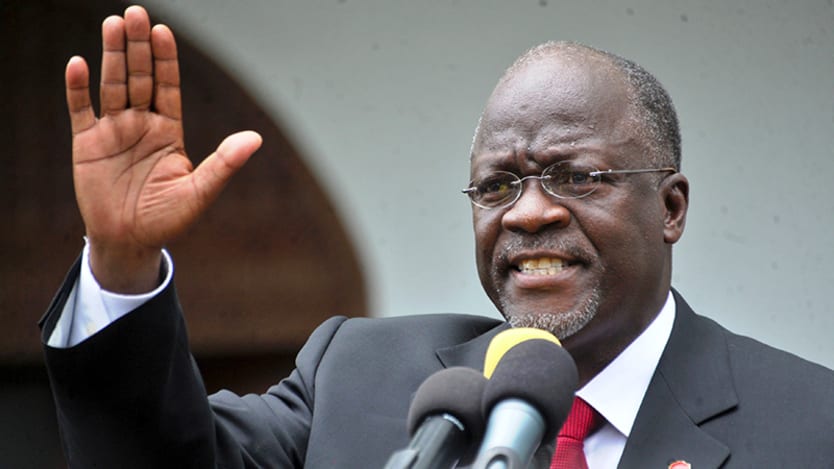
NAIROBI — Tanzania’s President John Magufuli has created a climate of fear for NGOs during his four-year tenure — particularly targeting groups working on LGBTQ and reproductive rights, according to a report released Monday by Human Rights Watch.
His government has adopted and enforced laws and practices that severely restrict activities, resulting in the arbitrary deregistering or suspension of NGOs — including on accusations of violating Tanzanian “ethics and culture” — and the arrest and harassment of NGO workers.
“We found in Tanzania that civil society organizations, including NGOs, are operating in a climate of fear,” Oryem Nyeko, Uganda and Tanzania researcher in the Africa division of Human Rights Watch, told Devex. “They feel like they can’t speak out or do the kind of work that they ought to be doing to address the issues that they aim to. The consequence is that often times these issues are not addressed.”
“The sense that we have is that there is an overarching closing space for NGOs to work in.”
— Oryem Nyeko, Uganda and Tanzania researcher, Human Rights Watch, Africa divisionThe censorship and resulting self-censorship is “effectively silencing” organizations working in areas such as health, education, and equal rights, according to the report.
While some of the restrictive trends were in place before President Magufuli came into power in 2015, it notes, they have intensified since he took office. Government officials have also sent threatening letters and verbally warned NGO representatives not to carry out planned activities.
In 2017, the government suspended the registration of new NGOs — which is regulated by the Ministry of Health, Community Development, Gender, Elderly and Children — and began a process of verifying existing NGOs. It introduced complex new requirements such as submitting authorization letters from the regions or districts in which they work and declaring planned expenditures within 14 days of obtaining funds. Authorities threatened to deregister NGOs that could not comply.
Regional and district commissions have used their own powers to “arbitrarily block NGOs from accessing people residing within their jurisdictions,” often forcing NGO workers to seek multiple permits before they can travel or insisting that they are accompanied by government representatives.
Authorities have also used existing regulations around research permits and immigration visas to prevent some groups from operating, according to the report.
Groups working on LGBTQ rights have faced particular repression in a country where homosexuality remains illegal. This includes police raids of meetings and workshops, arrests of participants, forced anal exams, and the destruction and confiscation of property.
In 2017, the government banned organizations from conducting HIV prevention activities for gay men and subsequently deregistered several organizations working on sex rights.
Magufuli’s administration has also hindered access to education and reproductive health, according to the report.
In 2017, he announced that the government would enforce a decades-old rule that bans pregnant girls and teen mothers from attending school. The home affairs minister then threatened to deregister organizations that challenged the decision. Tanzanian police have since arrested pregnant schoolgirls and forced girls to take pregnancy tests in schools.
In response, the World Bank withdrew a $300 million education loan that was already approved for the country. It was recently re-approved after the government expressed willingness to respond to the criticisms, Nyeko said.
“I’m not aware of individual cases of girls being arrested or being prohibited from attending school recently,” he said.
The crackdown has also threatened the creation and dissemination of independent information, according to the report.
The 2015 Statistics Act criminalized the publication of statistics not approved by the government and blocked independent research. It was amended this year after criticisms from the World Bank Even but authorities “still maintain control on who can gather and disseminate statistical information and determine what is factual and false,” according to Amnesty International, which also released a report Monday with similar findings.
The 2015 Cybercrimes Act has also led some NGOs to stop publishing information online, while the 2016 Media Services Act "creates broad and unclear criminal offenses that are open to abuse, including the publication of statements which threaten … ‘public order' or 'public morality.’”
NGOs told Human Rights Watch that the local media is also not reporting on their work out of fear of retaliation. For example, the government fined five TV stations about $27,000 for broadcasting an NGO press conference.
Because of these restrictions, some civil society organizations are turning to international organizations and agencies, as well as foreign embassies, to publish their work, or are choosing to work through internationally-based NGOs.
“The sense that we have is that there is an overarching closing space for NGOs to work in,” Nyeko said.








